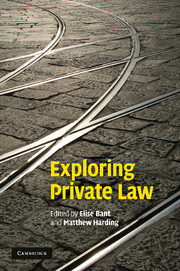Book contents
- Frontmatter
- Contents
- List of Contributors
- Foreword
- Acknowledgments
- Table of Cases
- Table of Legislation
- Introduction
- I Method
- II Unjust enrichment
- 7 The impact of legal culture on the law of unjustified enrichment: the role of reasons
- 8 Natural obligations and unjust enrichment
- 9 Causality and abstraction in the common law
- 10 Trust and theft
- III Equity and trusts
- IV Remedies
- Index
- References
10 - Trust and theft
Published online by Cambridge University Press: 10 November 2010
- Frontmatter
- Contents
- List of Contributors
- Foreword
- Acknowledgments
- Table of Cases
- Table of Legislation
- Introduction
- I Method
- II Unjust enrichment
- 7 The impact of legal culture on the law of unjustified enrichment: the role of reasons
- 8 Natural obligations and unjust enrichment
- 9 Causality and abstraction in the common law
- 10 Trust and theft
- III Equity and trusts
- IV Remedies
- Index
- References
Summary
This chapter concerns the trust as a response to theft. For anyone hoping to recover misappropriated assets or their traceable proceeds, this is an important practical issue. For a trust lawyer, it also involves fascinating questions about the division between law and equity, the nature of equitable interests, and the reasons why trusts arise. It is an issue wherever there is a law of trusts, but of particular interest in Australia thanks to the High Court's judgment in Black v S Freedman & Co Ltd. An employee stole money from his employer and paid it to his wife, and the court held that the traceable proceeds of the stolen money were held in trust for the employer. While this might have been regarded as a trust arising in response to a breach of fiduciary duty, O'Connor J did not rely on this, but said, ‘[w]here money has been stolen, it is trust money in the hands of the thief, and he cannot divest it of that character’.
This trust has been the subject of a recent debate in the Journal of Equity between Susan Barkehall Thomas and John Tarrant. Barkehall Thomas argued that a trust is not possible so long as the victim retains legal title to the stolen assets, but if that title is lost, then the traceable proceeds can be held in trust.
- Type
- Chapter
- Information
- Exploring Private Law , pp. 223 - 246Publisher: Cambridge University PressPrint publication year: 2010
References
- 2
- Cited by



